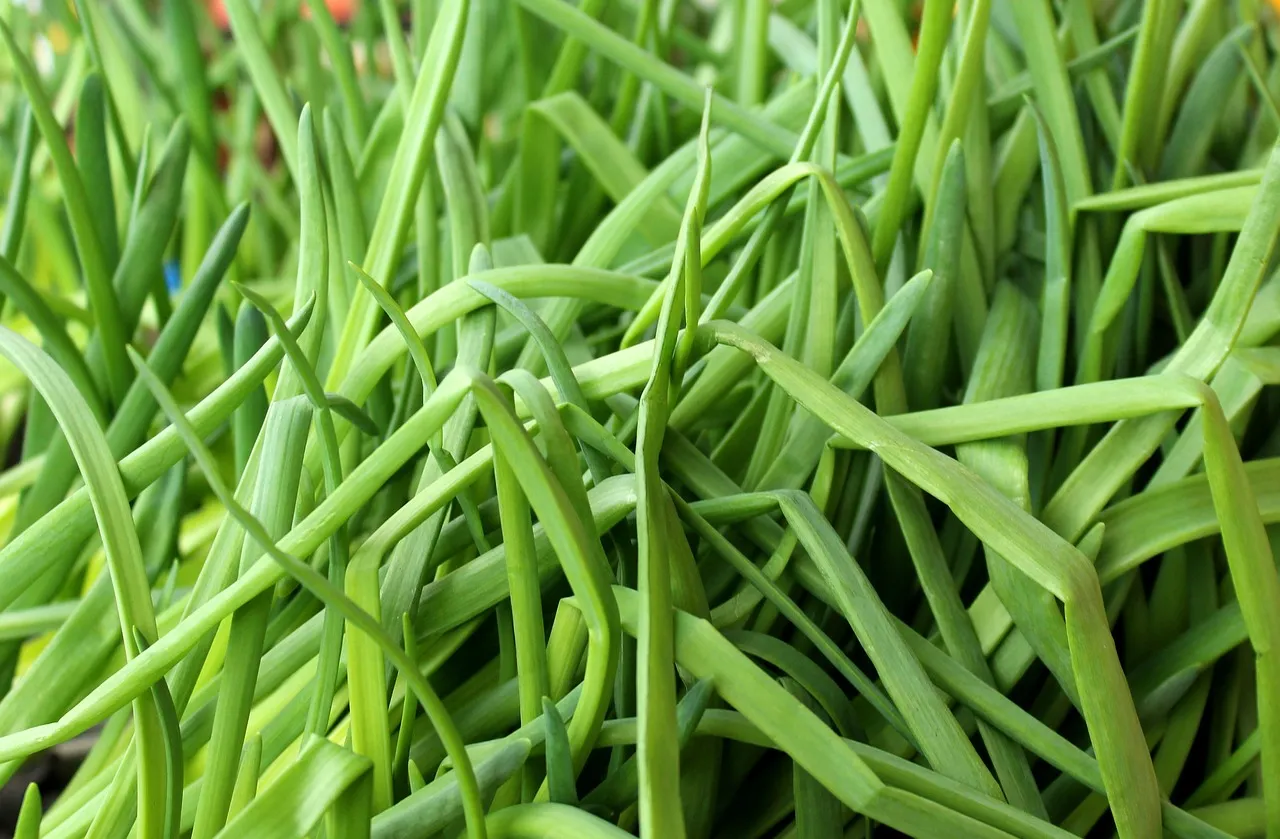Chives, a versatile and flavorful herb, offer a multitude of benefits and uses for balcony gardening enthusiasts. With their vibrant green leaves and delicate purple flowers, chives not only add beauty to your balcony garden but also provide a range of culinary and medicinal advantages. From enhancing the taste of your favorite dishes to promoting overall well-being, the chives plant is a must-have addition to any balcony garden. In this blog post, we will explore the various benefits and creative uses of chives, empowering you to maximize the potential of this remarkable herb in your own balcony gardening endeavors. Let’s delve into the world of chives and discover how they can elevate your gardening and culinary experiences.
The Nutritional Value of Chives: A Powerhouse of Vitamins and Minerals for Your Balcony Garden
When it comes to the nutritional value of chives, these vibrant herbs are nothing short of a powerhouse, packed with an array of vitamins and minerals that can greatly benefit your balcony garden. Chives are an excellent source of vitamin C, providing a refreshing dose of this essential nutrient that supports immune function and promotes collagen production. Additionally, they contain vitamin K, which plays a crucial role in maintaining healthy bones and aiding blood clotting.
Chives also boast an abundance of minerals, including potassium, calcium, and iron, which contribute to proper muscle function, bone health, and oxygen transportation within the body. By incorporating chives into your balcony gardening repertoire, you can effortlessly infuse your meals with a nutritious punch while adding a touch of elegance to your outdoor space. Embrace the versatility of chives and harness their exceptional nutritional benefits for a thriving balcony garden.
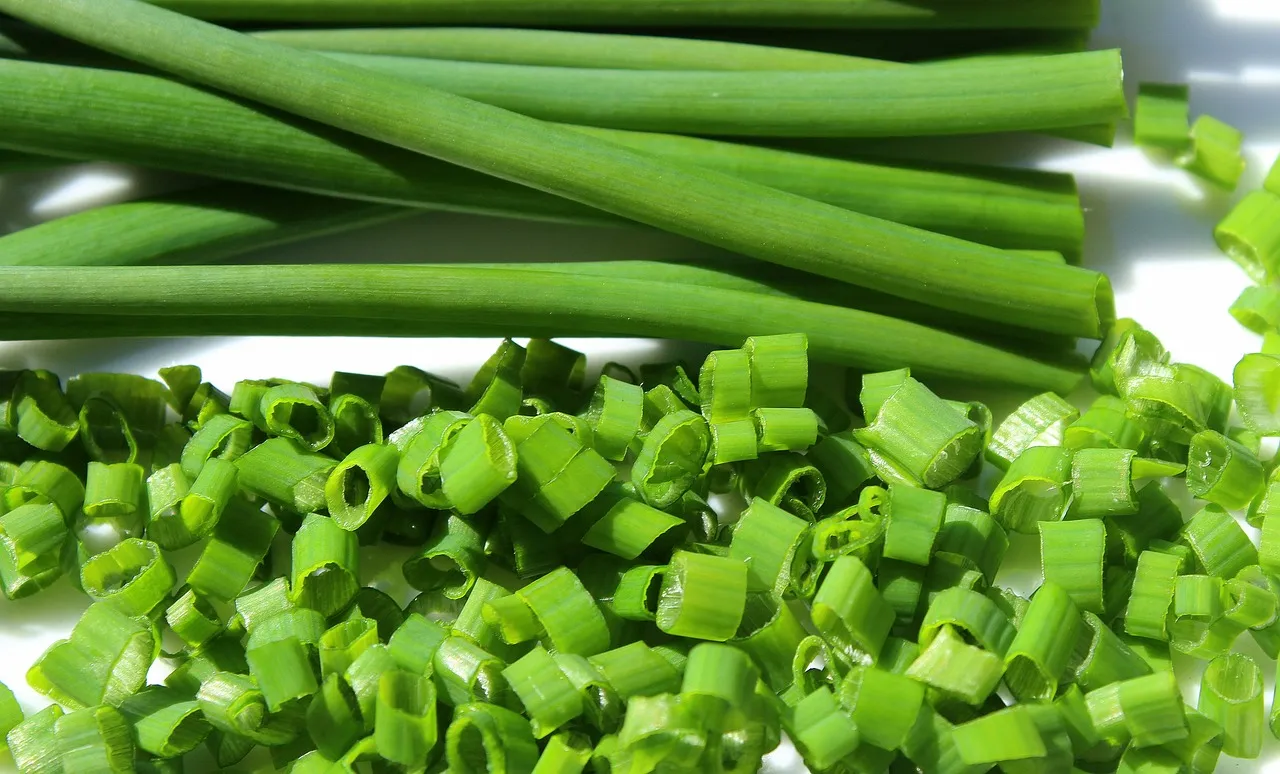
Culinary Delights: Exploring the Flavorful Uses of Chives in Balcony Cooking
Culinary enthusiasts and balcony gardeners alike can rejoice in the flavorful delights that chives bring to their cooking endeavors. The uses of chives in balcony cooking are as diverse as they are delicious. These slender, aromatic herbs lend a mild onion-like flavor with subtle hints of garlic, making them a versatile ingredient in various dishes. Finely chopped chives make for a delightful garnish, adding a pop of color and a burst of freshness to salads, soups, and omelets.
Their delicate taste also complements creamy dips, sauces, and spreads, elevating the overall flavor profile. Chives can be incorporated into compound butters, imparting a savory twist to grilled meats and vegetables. The possibilities are endless, and with chives readily available in your balcony garden, you have the opportunity to experiment and create culinary masterpieces that tantalize the taste buds. Discover the incredible flavor potential of chives in your balcony cooking and unlock a world of culinary delights.
Chives as Natural Pest Repellents: Keeping Your Balcony Garden Pest-Free the Eco-Friendly Way
In addition to their culinary and aesthetic appeal, chives also offer a natural and eco-friendly solution to keep pesky pests at bay in your balcony garden. Chives possess natural properties that act as effective pest repellents, making them a valuable addition to your gardening arsenal. Their pungent aroma acts as a deterrent for common garden pests like aphids, slugs, and snails, helping to protect your precious plants without resorting to harmful chemical pesticides.

By strategically planting chives in your balcony garden, you create a natural barrier that pests are inclined to avoid. This not only safeguards the health and vitality of your plants but also promotes a balanced and harmonious ecosystem on your balcony. Embrace the power of chives as natural pest repellents and enjoy a thriving, pest-free balcony garden in an environmentally friendly way.
Types of Chives Seen
Common Chives: Common chives, also known as Allium schoenoprasum, are the most widely recognized type of chives. They are characterized by their slender, hollow leaves and vibrant green color. Common chives produce beautiful lavender-pink flowers that not only add aesthetic appeal to your balcony garden but also attract pollinators. These versatile herbs have a mild onion flavor and are commonly used in a variety of dishes, including soups, salads, and sauces. Common chives are easy to grow and adapt well to container gardening, making them a perfect choice for balcony gardening enthusiasts.
Garlic Chives:
Garlic chives, scientifically known as Allium tuberosum, are another popular variety of chives. As the name suggests, they have a distinct garlicky flavor, adding a delightful twist to your culinary creations. Garlic chives feature flat, strap-like leaves and produce clusters of small white flowers. They are a favorite among gardeners for their attractive appearance and versatile use in various cuisines, including Asian dishes. Garlic chives are also valued for their medicinal properties, believed to aid digestion and promote overall well-being.
Siberian Chives:
Siberian chives, or Allium nutans, are a hardy variety of chives that can withstand colder temperatures, making them suitable for balcony gardens in colder climates. They have broader leaves compared to common chives and produce delicate lavender flowers that sway gracefully in the wind. Siberian chives have a milder flavor compared to their counterparts, making them a versatile addition to a wide range of dishes. Their ability to thrive in cooler conditions makes them an excellent choice for balcony gardeners looking to enjoy the benefits of chives throughout the year.
Chinese Chives:
Chinese chives, scientifically known as Allium odorum, are a popular variety commonly used in Chinese cuisine. These chives have flat, tender leaves with a mild garlic flavor, often preferred over common chives in Asian dishes. Chinese chives are highly adaptable and can grow well in different climates, making them suitable for balcony gardens worldwide. They are known for their resilience and ability to tolerate challenging growing conditions. The leaves and flowers of Chinese chives are not only prized for their culinary uses but also valued for their potential medicinal benefits.
Giant Siberian Chives:
Giant Siberian chives, or Allium ledebourianum, are an impressive variety that lives up to their name. They are known for their tall and robust growth, reaching heights of up to three feet. With their eye-catching appearance, giant Siberian chives make a striking addition to balcony gardens, adding vertical interest and a touch of elegance. They produce clusters of pink-purple flowers that create a captivating display. Like other chives, giant Siberian chives have a mild onion flavor and can be used in various recipes. Despite their towering stature, they are well-suited for container gardening, making them a great choice for balcony gardeners looking for a unique and impactful herb.
Aesthetic Appeal: Enhancing Your Balcony with Chives’ Beautiful Purple Flowers
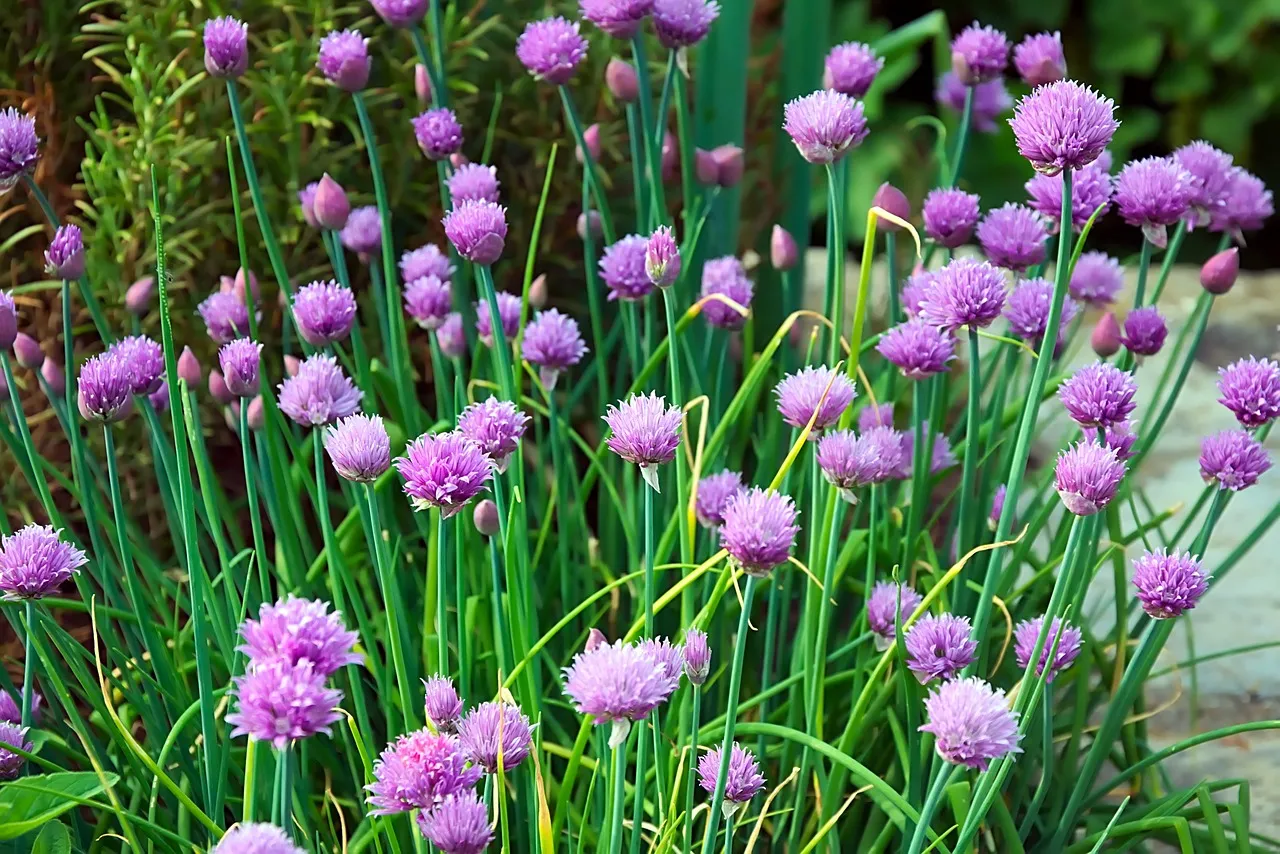
When it comes to enhancing the visual appeal of your balcony garden, the chives plant proves to be an exceptional choice. One of the standout features of chives is their beautiful purple flowers that gracefully adorn the plant. These delicate blooms not only add a touch of elegance to your outdoor space but also attract beneficial pollinators like bees and butterflies, contributing to a thriving and vibrant ecosystem. The vivid purple hue of chive flowers creates a striking contrast against the lush green foliage, creating a visually stunning display.
Whether you have a small balcony or a spacious terrace, incorporating chives with their captivating flowers can instantly elevate the aesthetics of your outdoor oasis. Let the chives’ beautiful purple flowers become a focal point of your balcony garden, captivating the eyes and uplifting the overall ambiance of your outdoor sanctuary.
Chives for Health and Wellness: Boosting Immunity and Supporting Digestive Health
When it comes to health and wellness, chives are an unsung hero, offering numerous benefits that can contribute to your overall well-being. These flavorful herbs are known to be rich in immune-boosting properties, making them a valuable addition to your balcony garden. Chives contain vitamin C, which plays a vital role in strengthening the immune system and protecting the body against infections and illnesses. Additionally, chives possess antibacterial properties that can help combat harmful bacteria in the digestive system, promoting digestive health.
They can aid in soothing gastrointestinal discomfort and supporting proper digestion. By incorporating chives into your balcony gardening routine, you not only have access to fresh, nutrient-packed herbs but also an opportunity to harness their health-enhancing potential. Prioritize your health and wellness with the versatile chives plant, and let it be a natural ally in boosting your immunity and supporting your digestive health.
DIY Chive Infused Oils and Vinegars: Adding a Gourmet Touch to Your Balcony-Grown Herbs
Elevate your culinary creations to new heights by incorporating DIY chive-infused oils and vinegars into your balcony-grown herb collection. Chives offer a distinctive and delightful flavor that can be expertly infused into oils and vinegars, adding a gourmet touch to your dishes. Making your own chive-infused oils and vinegars is surprisingly simple. Begin by harvesting fresh chives from your balcony garden, ensuring they are at their peak of flavor. Then, gently bruise the chives to release their aromatic oils before placing them into a clean jar.
Fill the jar with your choice of high-quality oil or vinegar, such as olive oil or white wine vinegar. Allow the mixture to infuse for several weeks, allowing the flavors to meld and intensify. Once ready, strain the infused oil or vinegar and transfer it to a beautiful bottle for storage and use. The resulting chive-infused oils and vinegars can be drizzled over salads, used as a marinade, or incorporated into dressings and sauces, imparting a unique and delectable taste to your dishes. Unleash your creativity in the kitchen and add a gourmet flair to your meals with DIY chive-infused oils and vinegars created from the bounty of your balcony garden.
Chives as Ornamental Plants: Creating a Stunning Visual Display in Your Balcony Garden
In addition to their culinary and medicinal benefits, chives also possess ornamental qualities that make them an excellent choice for creating a visually stunning display in your balcony garden. With their slender, grass-like leaves and vibrant purple flowers, chives add a touch of elegance and charm to any outdoor space. Whether planted in containers, hanging baskets, or flower beds, chives can serve as beautiful focal points or charming border plants.
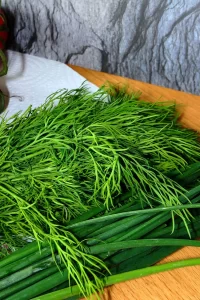
Their graceful foliage and striking blooms create a captivating visual contrast against other plants, while their upright growth habit adds vertical interest to your balcony garden. Chives also attract beneficial pollinators like bees and butterflies, further enhancing the vibrant and lively atmosphere of your outdoor sanctuary. Embrace the ornamental potential of chives and let their beauty and grace elevate the visual appeal of your balcony garden, transforming it into a breathtaking and enchanting oasis.
Chives in Small Spaces: Maximizing Vertical Gardening with Compact Chive Varieties
When it comes to balcony gardening in small spaces, chives prove to be a valuable ally in maximizing your vertical gardening potential. With compact chive varieties specifically bred for smaller spaces, you can easily cultivate these flavorful herbs even in the tightest of spaces. Vertical gardening allows you to make efficient use of vertical surfaces, such as walls, trellises, or hanging planters. Chives are well-suited for vertical gardening due to their upright growth habit and compact nature.
By utilizing hanging planters or installing trellises, you can grow chives vertically, freeing up valuable floor space on your balcony. These space-saving chive varieties not only provide a bountiful harvest but also add a touch of greenery and vibrancy to your vertical garden. Whether you have a tiny balcony or limited floor space, consider incorporating chives into your vertical gardening endeavors to enjoy the benefits of fresh herbs while maximizing every inch of your small balcony garden.
Chives and Companion Planting: Ideal Pairings for Thriving Balcony Gardens
Companion planting is a clever and strategic gardening technique that involves pairing certain plants together to create a mutually beneficial environment. When it comes to balcony gardening, chives are an excellent choice for companion planting due to their versatility and compatibility with a wide range of plants. Chives act as natural pest deterrents, repelling insects that can harm nearby plants. They also attract beneficial pollinators, such as bees and butterflies, which can enhance the overall health and productivity of your balcony garden.
Pairing chives with other plants can help create a balanced ecosystem, promoting healthier growth and increasing resistance to diseases and pests. Some ideal companion plants for chives in a balcony garden include tomatoes, carrots, lettuce, peppers, and strawberries. These combinations not only maximize space but also enhance the flavors and growth of the paired plants. Embrace the concept of companion planting with chives, and witness the synergy and harmony that can thrive within your balcony garden, ultimately leading to a more abundant and flourishing harvest.
Chives for Urban Beekeeping: Attracting Pollinators to Your Balcony and Supporting Local Ecosystems
Chives, with their delightful purple flowers and alluring fragrance, can play a vital role in supporting urban beekeeping efforts while beautifying your balcony garden. Bees are essential pollinators, playing a crucial role in the reproduction of many plants, including fruits and vegetables. By planting chives in your balcony garden, you provide a valuable food source for bees, attracting these important pollinators to your urban environment. The nectar-rich flowers of chives entice bees, encouraging their visits and aiding in the pollination of neighboring plants.
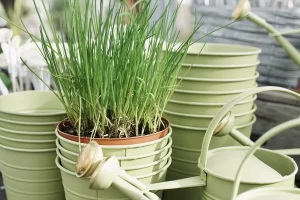
Supporting local ecosystems and promoting biodiversity are key benefits of incorporating chives into your balcony garden. Not only do you contribute to the survival and well-being of bees, but you also enhance the overall health and productivity of your surrounding plant life. Embrace the role of chives in urban beekeeping, and witness the positive impact they have on your balcony and the wider ecosystem, creating a symbiotic relationship between nature and your urban living space.
Chive Tea and its Therapeutic Benefits: A Soothing Beverage from Your Balcony Herb Garden
Indulge in the therapeutic goodness of chive tea, a soothing and invigorating beverage that can be brewed right from your very own balcony herb garden. Chive tea is gaining popularity for its potential health benefits and delightful flavor. To prepare this herbal infusion, simply harvest a handful of fresh chive leaves from your balcony garden and steep them in hot water for a few minutes. The resulting infusion boasts a delicate yet savory taste, reminiscent of mild onion and subtle garlic notes.
Chive tea is known for its potential therapeutic properties, including its antioxidant and anti-inflammatory effects. It may aid in digestion, support immune function, and promote overall well-being. Sipping on a warm cup of chive tea can provide a moment of tranquility and rejuvenation amidst the hustle and bustle of everyday life. Embrace the natural healing power of chives and enjoy the therapeutic benefits of this soothing beverage, brewed with love from your very own balcony herb garden.
Chives in Traditional Medicine: Exploring Historical Uses and Folklore Surrounding this Versatile Herb
Chives, with their rich history and cultural significance, have long been valued not only for their culinary uses but also for their role in traditional medicine. Exploring the historical uses and folklore surrounding this versatile herb adds a fascinating dimension to the world of chives. Throughout history, chives have been associated with various medicinal properties, ranging from promoting digestion and soothing coughs to acting as a diuretic and an aphrodisiac. In ancient times, chives were believed to have protective powers and were used to ward off evil spirits. Folklore and superstitions surrounding chives are intertwined with notions of luck, love, and prosperity.
While modern science continues to uncover the potential health benefits of chives, delving into the historical uses and folklore surrounding this herb provides a deeper appreciation for its cultural significance. By incorporating chives into your balcony gardening repertoire, you not only tap into its versatile culinary uses but also pay homage to centuries of tradition and wisdom associated with this remarkable plant.
Chive Fertilizer and Soil Amendments: Nurturing Healthy Growth in Your Balcony Garden
Nurturing healthy growth in your balcony garden is essential for the success of your chives, and one effective way to achieve this is through the use of chive fertilizer and soil amendments. Chives, like any other plants, require proper nutrients to thrive and reach their full potential. Organic fertilizers, such as compost or well-rotted manure, can be incorporated into the soil to enrich it with essential nutrients. This helps in promoting robust growth, improving soil fertility, and enhancing the flavor and aroma of the chives.
Additionally, chives benefit from soil amendments like vermiculite or perlite, which improve drainage and aeration, ensuring that the roots have access to the right balance of moisture and oxygen. These soil amendments can also help prevent waterlogging and reduce the risk of root diseases. By providing your chives with the necessary nourishment and creating an optimal growing environment, you lay the foundation for healthy and thriving plants in your balcony garden. Embrace the practice of using chive fertilizer and soil amendments to nurture the growth of your beloved chives and witness the bountiful rewards they bring to your balcony gardening endeavors.
Chive Crafts and DIY Projects: Getting Creative with Chives in Balcony Decor and Gifts
Unleash your creativity and explore the world of chive crafts and DIY projects to add a unique touch to your balcony decor and create thoughtful gifts. Chives offer more than just culinary delights; they can also be transformed into charming and aromatic creations. From chive wreaths and herb bundles to chive-infused candles and handmade soaps, there are endless possibilities for incorporating chives into your crafting endeavors. Balcony decor can be enhanced with chive-inspired elements, such as dried chive flower arrangements or chive-themed artwork. Chive crafts also make for wonderful gifts that showcase your thoughtfulness and green thumb.
Create personalized herb-infused oils or vinegar bottles, or design custom chive-themed cards or bookmarks. The beauty of chive crafts lies in their versatility and the opportunity to infuse your personal touch into every project. Let your imagination run wild, gather inspiration from the bounty of your balcony garden, and embark on a creative journey with chives. Embrace the artistry of chive crafts and DIY projects to elevate your balcony decor and create cherished gifts that celebrate the versatility and beauty of these remarkable plants.
Most Frequently Question Asked on Chives
Are chives easy to grow on a balcony?
Answer: Chives are indeed a fantastic herb to grow on a balcony due to their ease of cultivation. Whether you have a spacious balcony or limited space, chives can thrive and provide a fresh supply of flavorful leaves. One of the reasons why chives are popular among urban gardeners is their adaptability to container gardening.
With the right conditions, chives are relatively easy to grow and maintain. They require a minimum of six hours of sunlight per day, making a sunny balcony an ideal spot for them. If your balcony doesn’t receive sufficient sunlight, you can supplement it with artificial grow lights to ensure the plants receive the necessary light intensity.
When it comes to soil, chives are not particularly picky. They can grow well in a variety of well-draining soil mixes. You can use commercial potting soil or create your own by combining equal parts of compost, garden soil, and perlite or vermiculite to improve drainage.
Watering chives is fairly straightforward. They prefer evenly moist soil, but it’s important to avoid overwatering, as excessive moisture can lead to root rot. Allow the top layer of soil to dry slightly between waterings and ensure proper drainage to prevent waterlogging.
Growing chives on a balcony has a lot of benefits, including their small size. They are great for tiny pots or hanging baskets because of their thin, erect leaves that don’t take up much room. To make the most of your balcony area, you could even plant them there with other herbs or vegetables in a vertical garden system.
Overall, chives are a low-maintenance herb that, with the right care, can flourish in a balcony garden. Whether you’re a novice or seasoned gardener, their versatility, small size, and delectable flavour make them a fantastic choice for balcony gardening aficionados.
How do I propagate chives?
Answer: Propagating chives is a straightforward process that allows you to expand your chive garden and share this versatile herb with others. There are two primary methods of propagating chives: division and seeds.
To propagate chives through division, start by identifying a mature clump of chives in your garden. In early spring or fall, when the plant is not actively growing, carefully dig up the clump and gently separate the individual bulbs, ensuring each division has its own set of roots. Replant the divisions at the same depth they were previously growing or slightly shallower to encourage new growth. Water the newly divided chives generously and keep the soil consistently moist until they establish themselves.
Alternatively, you can propagate chives from seeds. Collect seeds from mature chive plants once the flowers have dried and the seed heads have turned brown. Sow the seeds indoors in well-draining soil, about 8-10 weeks before the last frost date in your area. Keep the soil moist and give it plenty of light. Once the seedlings have grown a few inches tall, they can be transplanted into individual containers or directly into your balcony garden.
Regardless of the method you choose, proper care and attention are essential during the propagation process. Whether you’re expanding your chive garden or sharing the joy of gardening with others, propagating chives is a rewarding experience that allows you to enjoy the delightful flavors and numerous benefits of this versatile herb.
Can I grow chives indoors?
Answer: Yes, you can definitely grow chives indoors and enjoy their fresh flavors and benefits all year round. Chives are well-suited for indoor cultivation due to their compact size and relatively low maintenance requirements. Whether you have a sunny windowsill or a dedicated indoor herb garden, growing chives indoors is a great way to add freshness to your culinary creations.
To successfully grow chives indoors, provide them with a location that receives at least six hours of direct sunlight per day. A south-facing window is usually the best spot to ensure they receive sufficient light. If natural sunlight is limited, you can supplement it with artificial grow lights to meet their light requirements.
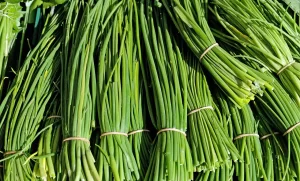
Choose a well-draining potting mix specifically formulated for container gardening. Plant your chive seeds or small chive plants in a container with good drainage holes to prevent waterlogging. Water the chives thoroughly when the top inch of soil feels dry, but be careful not to overwater them. It’s essential to maintain slightly moist soil without causing waterlogged conditions.
Maintain a moderate indoor temperature between 60-75°F (15-24°C) for optimum chive growth. Adequate air circulation is also crucial, so ensure there is good ventilation in the growing area.
Regularly harvest the chive leaves, starting from the outside and working your way in. This will encourage new growth and ensure a continuous supply of fresh chives for your culinary needs.
By providing the right conditions of light, well-draining soil, proper watering, and moderate temperatures, you can successfully grow chives indoors. Enjoy the convenience and pleasure of having fresh chives readily available for your cooking endeavors, even if you don’t have access to an outdoor garden.
How often should I harvest chives?
Answer: When it comes to harvesting chives, the frequency depends on your needs and the growth rate of the plants. Chives are a resilient herb that can handle frequent cutting without causing harm. In fact, regular harvesting can even stimulate new growth and promote a bushier plant.
As a general guideline, you can start harvesting chives when they have reached a height of about 6 inches (15 centimeters) or have developed a sufficient number of leaves. When harvesting, make sure to cut the leaves about 1 to 2 inches (2.5 to 5 centimeters) above the soil level, leaving some foliage intact to support the plant’s growth.
The frequency of harvesting can vary based on your culinary requirements and the growth rate of your chives. Typically, you can harvest chives every 2 to 4 weeks during the growing season. However, if your chives are growing vigorously, you may be able to harvest them more frequently, such as every 1 to 2 weeks.
It’s important to note that chives are best when consumed fresh, as their flavors tend to diminish when dried or stored for an extended period. Therefore, it’s recommended to harvest chives as needed for immediate use. This ensures you enjoy the full flavor and aroma of freshly cut chives in your dishes.
By regularly harvesting chives, you can keep the plants productive and encourage continuous growth. Just be mindful not to harvest more than one-third of the plant at a time, as this allows the chives to recover and continue thriving in your garden.
What are the culinary uses of chives?
Answer: Chives are an indispensable herb in the culinary world, appreciated for their delicate onion-like flavor and vibrant green color. Their versatility makes them an excellent addition to a wide range of dishes, both as a garnish and a key ingredient.
One of the most popular culinary uses of chives is as a garnish. Their slender, hollow leaves are finely chopped or snipped and sprinkled over various dishes, adding a burst of fresh flavor and visual appeal. Chives work wonders on soups, salads, omelets, and baked potatoes, instantly elevating the overall taste and appearance.
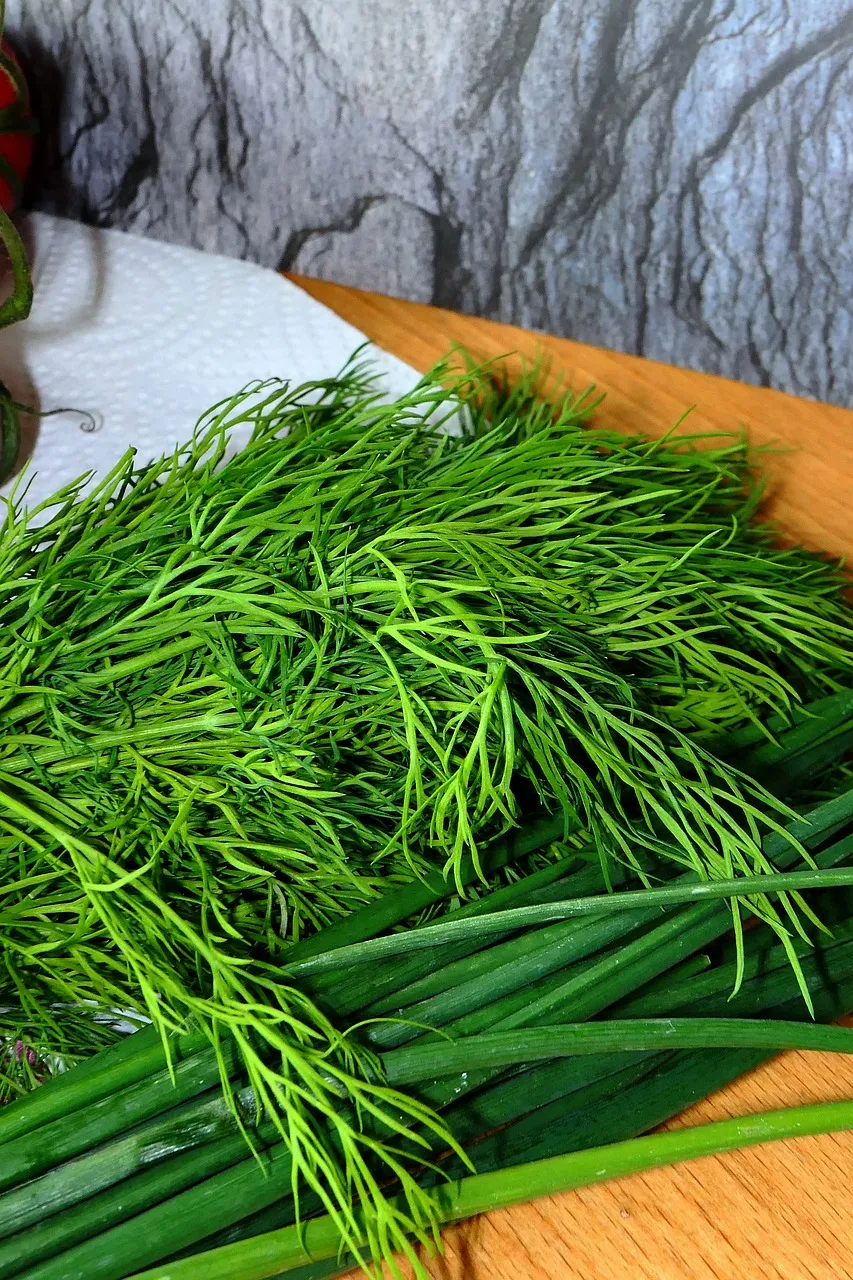
Beyond being a garnish, chives play a central role in numerous recipes. They can be finely chopped and incorporated into dips, sauces, and spreads, such as chive-infused cream cheese or chive butter. These preparations are perfect for spreading on bagels, crackers, or sandwiches, infusing them with a delightful oniony taste.
Chives also shine in egg-based dishes like quiches and frittatas, enhancing the savory notes. Additionally, they can be added to stir-fries and rice dishes, imparting a burst of flavor and a refreshing touch.
Their mild onion flavour makes them an awesome complement to seafood dishes, imparting a sweet but delightful taste that pairs well with various fish and shellfish.
Furthermore, chives are an important ingredient in herb blends, such as fine herbs, which typically include parsley and chervil. These herb mixtures add flavours to a wide range of dishes, including meats, vegetables, and sauces.
In conclusion, chives offer a wide range of culinary uses, from garnishing to enhancing the flavors of various dishes. Their sweet onion flavor and attractive appearance make them a favorite among chefs and home cooks alike, adding a delightful touch to countless recipes and elevating the overall dining experience-based meals like quiches and frittatas, chives also stand out and bring out the savoury flavours. They may also be used to offer a flavorful taste and a light touch to rice recipes and stir-fries.
Are chives beneficial for companion planting?
Answer: Certainly! Chives are not only valued for their culinary qualities but also for their numerous benefits as companion plants in the garden. Their unique properties make them excellent companions for a wide range of crops, promoting healthier growth and deterring pests.
One of the main benefits of chives as companion plants is their ability to repel pests. The strong aroma of chives acts as a natural deterrent for pests like aphids, carrot flies, and certain types of beetles. By interplanting chives with susceptible crops, you can help protect them from these unwanted invaders without the need for chemical pesticides.
Chives also attract beneficial insects to the garden. Their delicate purple flowers are irresistible to pollinators like bees and butterflies, helping to increase pollination rates and improve overall fruit and vegetable yields. Additionally, these beneficial insects can prey on harmful pests, contributing to a more balanced and sustainable garden ecosystem.
Another advantage of chives in companion planting is their ability to enhance the flavor of neighboring plants. Some gardeners believe that planting chives near carrots and tomatoes can improve their taste and even help deter diseases.
Additionally, chives have a shallow root system and do not compete vigorously for nutrients and moisture. Therefore, it is compatible with a wide variety of plants and can coexist harmoniously in garden beds and bathtubs.
In summary, chives offer several benefits as companion plants. It repels pests, attracts beneficial insects, enhances flavor and coexists peacefully with other plants. Incorporating chives into your garden can create a more resilient and productive growing environment for a wide variety of crops while reducing your need for harmful chemicals.
What are the health benefits of chives?
Answer: Chives not only add a burst of flavor to your dishes but also bring a host of health benefits to the table. These slender green herbs are packed with nutrients and have been used for centuries for their medicinal properties.
First and foremost, chives are rich in essential vitamins and minerals. They are particularly high in vitamins A and C, which are powerful antioxidants that help protect your cells from damage caused by free radicals. Vitamin C also supports a healthy immune system and aids in collagen production for healthy skin.
Chives are also a good source of minerals like potassium, calcium, and iron. Potassium plays a vital role in maintaining healthy blood pressure levels, while calcium is essential for strong bones and teeth. Iron is essential for red blood cell production and prevention of iron deficiency anemia. These substances may lower the risk of chronic illnesses including heart disease and some forms of cancer because they have anti-inflammatory and antioxidant characteristics.
They enhance general gut health, suppress the growth of certain bacteria and fungus, and may guard against infections.
Furthermore, chives are low in calories and high in fiber, making them a nutritious addition to a balanced diet. The fiber content helps support healthy digestion and can contribute to feelings of satiety, aiding in weight management.
In conclusion, chives offer a range of health benefits due to their nutrient content and bioactive compounds. From bolstering your immune system to providing antioxidant protection and supporting healthy digestion, chives are a versatile herb that can contribute to your overall well-being. So, next time you add chives to your culinary creations, know that you’re not only enhancing the flavor but also boosting the nutritional value of your meals.
Can I store chives for later use?
Answer: Yes, you can store chives for later use to enjoy their fresh flavor even when they are out of season. One common method is freezing chives. Start by washing and drying the chives thoroughly. Chop them into desired lengths and place them in an airtight container or freezer bag. Alternatively, you can also freeze chives in ice cube trays by filling each section with chopped chives and water. Once frozen, transfer the chive cubes into a freezer bag. When you need to use them, simply thaw the chives and incorporate them into your recipes. Freezing chives helps preserve their flavor and allows you to enjoy them throughout the year..
Can I grow chives from seeds?
Answer: Yes, you can grow chives from seeds. Start by sowing the seeds in well-draining soil indoors, about 8-10 weeks before the last frost date in your area. Keep the soil moist and give it plenty of light. Once the seedlings have grown a few inches tall, they can be transplanted into containers or your balcony garden.
How do I prevent chives from spreading and taking over my garden?
Answer: Chives can spread rapidly if left unchecked. To prevent them from taking over your garden, you can grow them in containers or use physical barriers like underground edging or pots sunk into the ground. Regular harvesting can also help control their growth by removing excess foliage and preventing them from producing flowers and seeds.
Are there different varieties of chives?
Answer: Yes, there are different varieties of chives that offer slight variations in taste, appearance, and growth characteristics. The most common variety is Allium schoenoprasum, which features slender green leaves and delicate purple flowers. However, other chive varieties include garlic chives (Allium tuberosum), which have a mild garlic flavor, and Siberian chives (Allium nutans), known for their blue-green leaves and larger flowers. Each variety offers a unique twist on the classic chive flavor and can add visual interest to your balcony garden. Whether you prefer the traditional chive variety or want to experiment with different flavors and appearances, there are options to suit every gardener’s preference.
Can I use chive flowers in cooking?
Answer: Yes, you may use chives in your cooking to add flavour and attractiveness to your food. Purple chives are edible, with a milder onion flavour than the leaves. They may be used as a garnish or sprinkled on salads, soups, or stir-fry dishes to give colour and a slight onion flavour. Chives can also be marinated or steeped in vinegar or oil to make a delicious salad dressing. Alternatively, each blossom can be used alone as a decorative element in meals or to embellish cakes. Chives’ flexibility and beauty make them a delectable complement to your culinary masterpieces.
How do I keep my chive plants healthy?
Answer: To keep your chive plants healthy, ensure they receive adequate sunlight, at least 6-8 hours a day. Use well-draining soil and water them regularly, allowing the soil to dry slightly between waterings. Applying a balanced organic fertilizer once or twice during the growing season can also help promote healthy growth.
Can I harvest chive seeds for future planting?
Answer: You may indeed collect chive seeds for later planting. Give the chive blooms time to finish blooming and form seed heads. Gather the seeds with care after the seed heads begin to turn brown and to open. Until you’re ready to plant them, keep them in an airtight container in a cold, dry location.
Are chives safe for pets?
Answer: Chives, along with other members of the Allium family, including onions and garlic, can be toxic to pets, especially cats and dogs. It’s best to keep chives away from your furry friends or any areas they can access. If you suspect your pet has ingested chives and shows symptoms like vomiting or diarrhea, it’s important to seek veterinary care immediately.
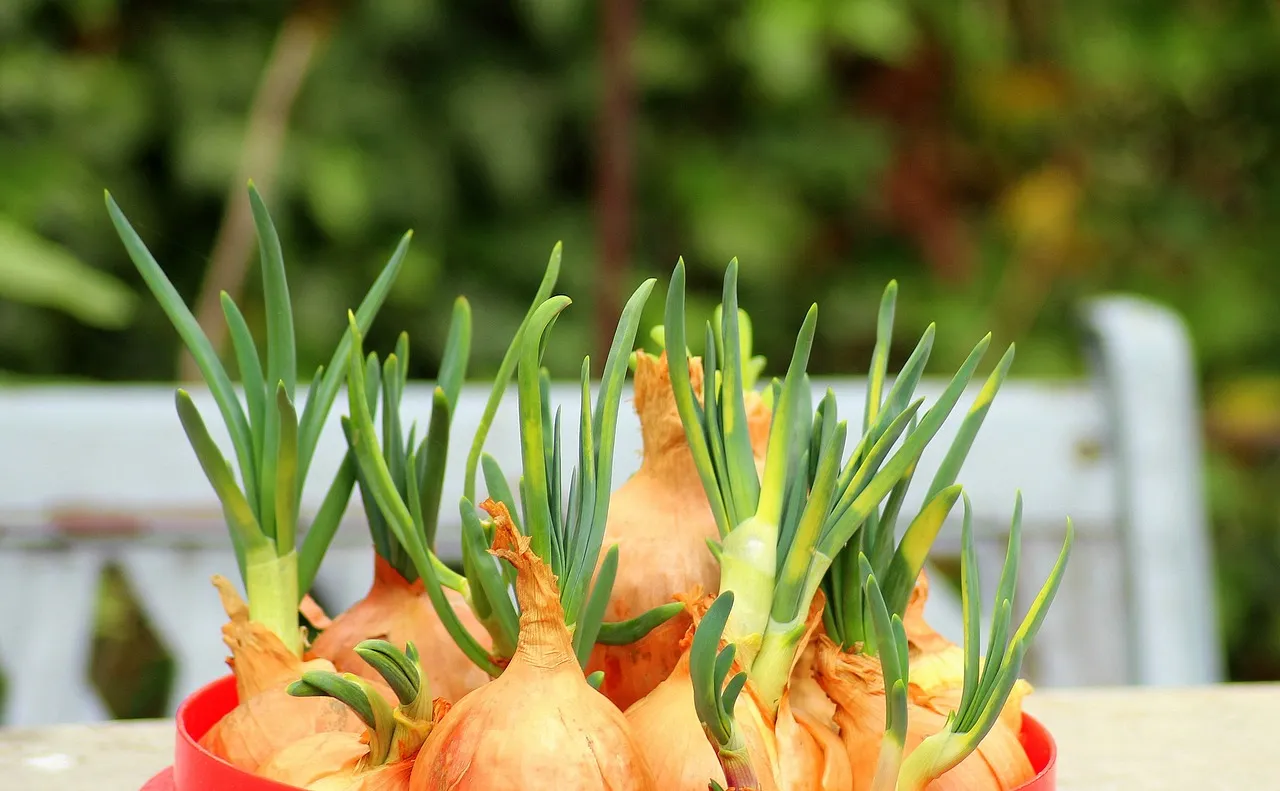
Conclusion
In conclusion, growing calendula plants on your balcony can be a rewarding and fulfilling experience, bringing beauty, health, and versatility to your gardening endeavors. By implementing the tips and tricks shared in this blog post, you can successfully cultivate thriving calendula plants that brighten up your balcony space. Remember to provide plenty of sunlight, well-drained soil, and regular watering to ensure optimal plant growth. Additionally, consider companion planting with chives, as they offer numerous benefits to your calendula plants, such as deterring pests and enhancing their overall health.
The chives, with their rich flavors and culinary uses, can also provide a delightful addition to your recipes. Whether you choose to grow calendula in pots, containers, raised beds, or window boxes, the vibrant flowers will add a touch of charm to your balcony garden. Explore the medicinal uses of calendula, harnessing its healing properties and creating natural remedies for various ailments. With proper care and attention, your calendula plants will reward you with their radiant blooms, enhancing your balcony with their vibrant colors and delicate fragrance. Embrace the joy of growing calendula and chives on your balcony, and discover the endless possibilities they bring to your gardening and culinary adventures. Happy gardening!
#chives #balconygardening #herbs #gardeningtips
